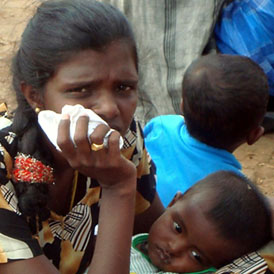Sri Lanka ‘war crimes’: UN chief can’t order probe
The UN Secretary-General says he lacks authority to order a probe into alleged war crimes in Sri Lanka. A video shown by Channel 4 News formed part of the evidence of a UN report into the killings.

Channel 4 News obtained a leaked copy of the United Nations report which points to crimes against humanity during the Sri Lanka civil war.
It indicated that actions by both the Sri Lankan government and the Liberation Tigers of Tamil Eelam (LTTE) could amount to war crimes and crimes against humanity.
The report blames both sides for deaths in Sri Lanka. But the elimination of the LTTE’s leadership by the government and its definitive defeat of the insurgency in May 2009 means that only government forces would be held to account in any inquiry.
The UN report specifically accuses the government of widespread shelling including targeting field hospitals, denying humanitarian aid, and committing rights violations against people inside and outside the conflict zone.
Read more: Channel 4 News special report on Sri Lanka
UN Secretary-General Ban Ki-moon said he lacks the authority to personally order a probe into the mass killings.
A UN panel appointed by Ban said during the 2008-2009 fighting in northeastern Sri Lanka that there was evidence that the government and the Liberation Tigers of Tamil Eelam were guilty of war crimes.
It recommended that those crimes be investigated and suspects prosecuted.
The panel urged the UN chief to proceed to establish “an independent international mechanism” to investigate the quarter-century war’s final stages.
But Ban said he could not automatically follow the recommendation of his advisory panel, whose report was rejected as biased and fraudulent by the Sri Lankan government.
Video broadcast by Channel 4 News used as evidence
The 26-year war officially finished in summer 2009, when the Sri Lankan army defeated the LTTE (Tamil Tigers) in an area the government named the "no-fire zone".
On the 25 August 2009 Channel 4 News received a video via email from a group calling itself Journalists for Democracy in Sri Lanka.
It showed naked, bound men being executed with a shot to the back of the head by two men in khaki uniforms on what appears to be a dirt road. It is bookended by two executions; by the end the bodies of nine naked men lie in the wasteland.
Read more: Sri Lanka execution video appears authentic
International pressure for investigation
A spokesman for Ban Ki-Moon said without consent of Sri Lanka’s government or a decision by the UN Security Council, General Assembly, Human Rights Council or other international body, Ban will not move to set up a formal investigation of the civilian deaths.
UN officials concede that Colombo would never consent to such an investigation of its conduct in the conflict.
Sri Lanka is not a member of the International Criminal Court, which means the Hague-based court would require a referral by the UN Security Council to investigate any possible war crimes there.
The council has only referred two previous situations to the ICC: the conflict in Sudan’s western Darfur region and Libya’s violent crackdown against anti-government rebels that sparked a Security Council decision to impose a no-fly zone over Libya.
In response to international pressure, Sri Lanka set up its own probe. Ban said it was important for the country to pursue “genuine investigations” into the civil war actions.
US envoy to the United Nations Susan Rice said the UN panel report showed “the need for an independent and full accounting of the facts … to ensure that allegations of abuse are addressed and impunity for human rights violations is avoided.”
In a statement, she added that Washington supports Ban’s call for Sri Lanka “to respond constructively to the report.”
Philippe Bolopion of the advocacy group Human Rights Watch disagreed with Ban’s assessment and urged him to set up an international inquiry. Despite Russian and Chinese reluctance, other Security Council members would support a formal UN investigation, he said.
“While we think such intergovernmental support would be highly desirable, we don’t consider it necessary to the creation of an investigative mechanism by (Ban),” he said.
Read more: 'Blame Russia and China for Sri Lanka failure, not UN's Ban'
-
Latest news
-
‘I violated my moral compass working for Trump,’ former lawyer testifies3m

-
Working class creatives in film and TV at lowest level in decade5m

-
Israeli police investigating attack on Gaza aid convoy4m

-
Biden announces major tariff increase on Chinese-imported green tech3m

-
‘If NHS can afford it, people with obesity should have Semaglutide,’ says weight loss expert5m

-




